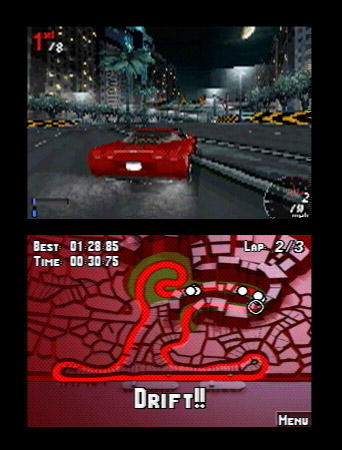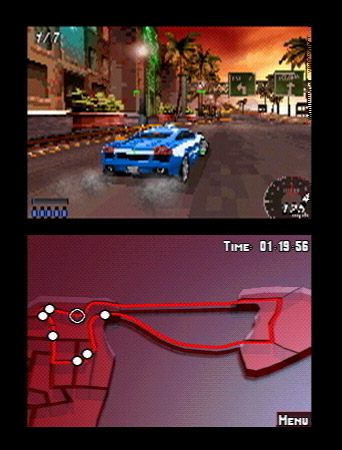As a developer with a strong background in mobile games, Gameloft knows how to make games that work well on the small screen. The studio's new street racer, Asphalt: Urban GT, showcases this ability quite well. It's a pretty derivative game, lifting elements from Colin McRae, Need for Speed Underground, and Burnout, but most of what it borrows is good and generally the game plays pretty well. Asphalt: Urban GT is quite obviously a game that was not designed with the DS specifically in mind, and it doesn't try to shoehorn in dual-screen or touch-sensitive elements where they're not necessary. This game is simply a fun little racer, and one of the best-looking DS launch titles to boot.

Asphalt looked pretty good when it was released earlier on the N-Gage, but it looks even better on the larger DS screen, and it sports a much, much better frame rate. The bevy of licensed cars featured in the game capture the look of their real-world counterparts quite accurately, even if they do tend to be a little boxy. Along with a downright impressive variety of cars, the game keeps the visuals interesting with tracks set in a great variety of locations. Each track has a unique and well-defined look, and they're all quite good at evoking the feel of the cities they're based on (smart use of shadows and some reflective effects help to further the feeling that you're actually in these environments). The rock-solid frame rate helps create a good sense of speed, which is further accentuated by the camera-rattle effect that accompanies the turbo boost. The draw-in distance is occasionally noticeable, but it's not bad enough that it affects the actual gameplay experience, and you really have to look to see it. All of the actual racing action takes place on the upper screen, and the lower screen primarily shows a course map and the current positions of all the racers. It's not a particularly inventive use of the lower screen, but it's functional, and being able to anticipate long straightaways helps to make the best use of your turbo boosts.
Though the game is graphically impressive, its sound leaves much to be desired. Our biggest issue with the sound is that of the actual cars. The effects themselves aren't that bad--the engine sounds good and throaty, with a layer of high-pitch whine at higher speeds, and the tires squeal around corners satisfyingly. But no matter what you're driving, be it an H2 Hummer, a Jaguar XKR, or a classic Morgan roadster, all the cars use exactly the same sound effects, which takes away from the uniqueness that the game otherwise does a pretty good job of imbuing all the cars with. Filling in any gaps in between the blaring car sounds is a rather trite soundtrack of mechanical break beats and by-the-numbers synth sounds.
Asphalt aims for a simple, arcade-inspired design ethic, and this is very much apparent in the game's controls, which consist simply of gas, brake, and turbo-boost buttons, and the D pad for steering. The game curiously allows you to extensively remap any single control function--if you want the left shoulder button to act as your right turn control, so be it--but the game's use of the DS touch screen is limited to menu navigation.
Taking a page from Criterion's Burnout series, the game allows you to increase the amount of nitrous you have at your disposal by drifting around corners, coming dangerously close to the other traffic on the streets and busting up certain objects on the side of the road, though you're also constantly gaining more turbo boost even when not pulling off such maneuvers. The N-Gage version of Asphalt was a lot more liberal with the boost, starting each race with more boost and filling your boost meter more quickly. That the DS version reins in the amount of boost you're given is a good thing, as it makes the overall game more challenging and requires you to be more thoughtful about when to use your turbo boost. The game has a pretty good sense of speed, and each of its 20-plus licensed cars handles fairly uniquely and appropriately. This occasionally leads to certain cars simply not being much fun to drive, but for the most part it works to the game's advantage.
The biggest fault in Asphalt's gameplay is with the collision detection, which is all over the place. The props that you can run into and destroy have no effect on your speed, and there are other objects--such as the palm trees that split part of the course on the Hong Kong track--that you can just pass right through. Collision with other cars is the worst, though. Bumping into other cars that are going in the same direction as you are is stuttery and unnatural looking. The game seems to always give priority to the other car in a collision, which means it's never to your advantage to rub with another racer, as they can easily nudge you off-course as you're drifting around a corner. Running into oncoming traffic causes your car to go into a canned spinout. This can actually occasionally work to your advantage, since you'll sometimes accelerate even more when you're spinning out and you'll usually retain that speed when you reset. Since the game's release on the N-Gage, it feels like Gameloft has cleaned up the collision detection in Asphalt a bit, but it still stands as the weakest link in the otherwise enjoyable gameplay.
It's obviously not a simulation, but Asphalt does make a nod to many rally-racing games by flashing the general direction of an upcoming turn moments before you hit it. This provides you with just enough time to position yourself and get ready to start applying the brakes to begin the drift. Asphalt gets a lot of mileage out of this straight-up control scheme with its decent variety of gameplay modes.
The arcade mode offers a variety of race types, including instant play, road challenge, free race, time attack, and cop chase. The instant play mode throws you into a random car on a random track in a random gameplay mode, no questions asked. The road challenges are a series of races against artificial intelligence opponents that are divvied up by class, and the free race is similar, though it's just a single race in which you can choose from any of the cars and race on any of the nine tracks in the game. Time attack takes out the other racers and the ambient street traffic, pitting you against the clock.
The cop chase mode is kind of like the classic Atari arcade game A.P.B., except in 3D. In a souped-up sports-car-cum-cop-car, your goal is to chase down a number of escaping cars before time runs out. All you have to do is line up behind the perp and keep him within the targeting overlay on your screen for a few seconds, and he'll automatically pull over. It sounds simple enough, but unfortunately the control in Asphalt isn't precise enough and the tracks are often curvy, which makes it exceedingly difficult to keep the cars in your sight long enough to pull them over. It's a good enough idea, but most rounds usually just end in frustration.
If you're looking for something a little bit bigger in scope than just a handful of races, the evolution mode gives you a garage and a series of race challenges in which you can win cash and cars. You can also go to car dealers and buy new cars, or buy performance- and aesthetic-based upgrades.

The game also features Wi-Fi multiplayer support for up to four players. You can choose a single race--in which you define what tracks you race on and what class of cars you race in--or you can go into the championship mode and select from a variety of race series in which the cars and tracks are already defined. The cop chase mode is also playable over Wi-Fi, though because of its cat-and-mouse mechanics, it's limited to two players. In all, the multiplayer functionality is pretty good, despite having a few quirks. Regardless of which mode you're in, all of the nonracing street traffic is missing. Also, there is no way to limit the classes of cars that players can choose from, giving players who have unlocked more cars a distinct advantage.
It doesn't really take great advantage of many of the features that make the DS unique, but Asphalt is still fundamentally an enjoyable arcade-style racer, regardless of the platform. The gameplay is fast and accessible, and there's enough variety in both the single- and multiplayer modes that you could spend a lot of time with the game.